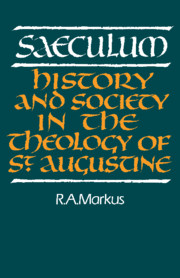Book contents
- Frontmatter
- Contents
- Introduction to the revised edition
- Preface
- Abbreviations
- 1 History: sacred and secular
- 2 Tempora Christiana: Augustine's historical experience
- 3 Civitas terrena: the secularisation of Roman history
- 4 Ordinata est res publica: the foundations of political authority
- 5 Afer scribens Afris: the Church in Augustine and the African tradition
- 6 Coge intrare: the Church and political power
- 7 Civitas peregrina: signposts
- Appendixes
- A History, prophecy and inspiration
- B De civitate Dei, XIX, 14–15 and the origins of political authority
- C Augustine and the Aristotelian revolution of the thirteenth century
- D ‘Sacred history’ and ‘salvation history’
- Bibliographical note
- List of works referred to
- Index
A - History, prophecy and inspiration
Published online by Cambridge University Press: 26 October 2009
- Frontmatter
- Contents
- Introduction to the revised edition
- Preface
- Abbreviations
- 1 History: sacred and secular
- 2 Tempora Christiana: Augustine's historical experience
- 3 Civitas terrena: the secularisation of Roman history
- 4 Ordinata est res publica: the foundations of political authority
- 5 Afer scribens Afris: the Church in Augustine and the African tradition
- 6 Coge intrare: the Church and political power
- 7 Civitas peregrina: signposts
- Appendixes
- A History, prophecy and inspiration
- B De civitate Dei, XIX, 14–15 and the origins of political authority
- C Augustine and the Aristotelian revolution of the thirteenth century
- D ‘Sacred history’ and ‘salvation history’
- Bibliographical note
- List of works referred to
- Index
Summary
The controversies of more than half a century concerning Augustine's intellectual development have brought us to a clearer appreciation of the authority with which Augustine endowed the holy scriptures from the very first days of his conversion to Christianity. The works of his maturity and old age supply ample testimony to the growing submission of his mind to the auctoritas divinarum scripturarum unde mens nostra deviate non debet. Even in his thirties, however, the young Augustine, with his adventurous mind giving its assent to the Christian faith, shared this basic conviction with the simplest piety of traditional, popular Christianity. Life within the Christian community and pastoral responsibility only deepened the hold of the scripture on his mind. Not unnaturally, he came to devote some thought to its status as the word of God.
The first of the works in which he was brought face to face with questions concerning the inspiration of the scriptures is his De consensu evangelistarum, written in the first year or two of the fifth century. Hermann Sasse has seen in this work the beginnings of a new idea of inspiration. The language which Augustine uses here, speaking of the evangelists writing their stories on the basis of God's suggestio, Sasse remarks, certainly allows more scope to the free creative work of the human author than did the cruder image of God using the writer as a tool or dictating the words, so widely current in the earlier tradition.
- Type
- Chapter
- Information
- SaeculumHistory and Society in the Theology of St Augustine, pp. 187 - 196Publisher: Cambridge University PressPrint publication year: 1989



